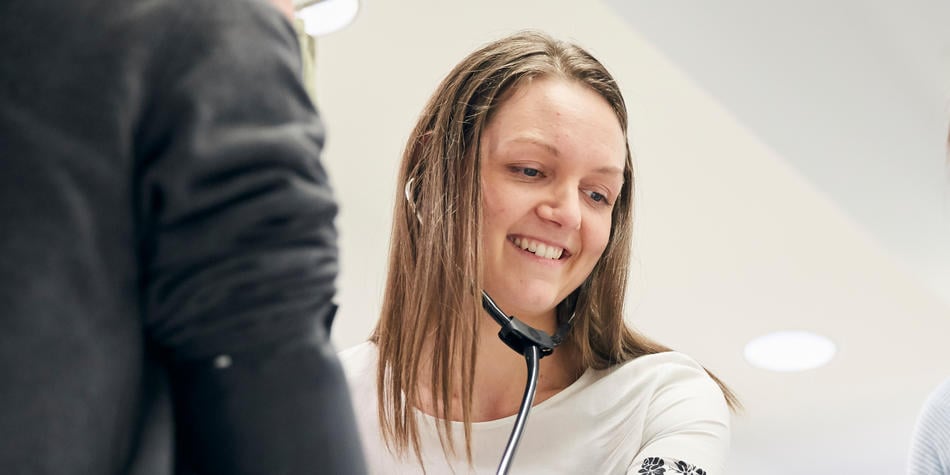Deakin’s Indigenous Entry Stream offers places to study the Bachelor of Vision Science/Master of Optometry, Bachelor of Medical Imaging or Doctor of Medicine.
It was Oceania Henry’s early experiences as a teenage hospital patient that first inspired her to pursue a career in medicine. ‘I was a bit underwhelmed at the lack of bedside manner – I was treated more like an organ than a person,’ she says. ‘I remember coming home and saying to my mum, “I can do better than this. I'm going to work really hard and try to become a doctor.”’
Fast forward 10 years and Oceania is now in her third year of Deakin’s Doctor of Medicine – courtesy of an impressive work ethic and the Indigenous Entry Stream, a pathway for Aboriginal and Torres Strait Islander students interested in courses in the School of Medicine. ‘It was the beginning of a new life for me – it changed everything,’ Oceania says.
Creating opportunities for Indigenous students
In partnership with the National Indigenous Knowledge Education Research Innovation (NIKERI) Institute , Deakin’s Indigenous Entry Stream offers entry streams specifically for Indigenous students keen to study a Bachelor of Vision Science/Master of Optometry, Bachelor of Medical Imaging or Doctor of Medicine.
To be eligible to apply for a place, students need to meet admission criteria through previous secondary or tertiary study. Crucially, prospective students who apply to study at Deakin through the Indigenous Entry Stream aren’t required to sit the Graduate Medical School Admission Test (GAMSAT), which is used to select students applying to study medicine at Australian universities.
‘I was worried it would mean I would never be able to be a doctor,’ Oceania says. ‘If I had to sit the GAMSAT, I probably wouldn't have gotten into medicine because I couldn't afford the exam as it’s very expensive and I’m not as good in timed exams, even though I'm really good at assignments.’
Oceania says the Indigenous Entry Stream acknowledges there’s more to assessing academic and occupational potential than one exam. ‘How do you communicate? Are you passionate? Are you involved in community? Deakin looks at the whole picture and what you could contribute overall, not just how well you do in an exam. It's not an easy pathway and you still have to work just as hard, but it is a different one that looks at the whole picture.’
Improving community health and wellbeing
Deakin’s Indigenous Entry Stream makes a difference not only to its students – it also helps to improve the health and wellbeing of the communities its graduates go on to serve. Indeed, an increase in the number of Indigenous medical practitioners often corresponds with better health outcomes for Indigenous Australians.
‘We empower Aboriginal and Torres Strait Islander people and community members to feel as though they can work as medical practitioners in and for their communities,’ says Kelsey Love, who works with Deakin’s School of Medicine Indigenous Health Team, which is responsible for managing the Indigenous Entry Stream.
‘For Aboriginal and Torres Strait Islander Australians to have the opportunity to attend a medical service and be treated by someone who they can identify with is really, really important and empowering.’
Oceania agrees it’s hugely important to grow the ranks of Indigenous health professionals in Australia. ‘Trust in medicine can completely change the outcome for patients and families,’ she says. ‘Especially in Aboriginal communities, the hospital is a place where everyone thinks you go to die, so understandably people often delay accessing health care.
‘As an Indigenous health professional, you have this unique insight into those concerns and it really helps to build good relationships with communities and patients.’
Following your passion
Perhaps unsurprisingly, Oceania says the course is ‘challenging’. Her clinical years require full-time placements and 12-hour days but, she says, ‘I'm exactly where I want to be’.
‘I'm working towards something that I'm passionate about in an area that I want to bring about change in, and I feel like I'm making a difference,’ she says.
Oceania encourages prospective students who are passionate about working in healthcare to apply for Deakin’s Indigenous Entry Stream.
‘If you can see yourself doing any other career, medicine is not for you because it's long hours and hard work,’ she says. ‘But if you've got that passion and you know that you can work hard, give it a go – just apply.
‘I look forward to the day where it doesn't sound unusual that Aboriginal people do these kinds of careers.’
If you’re passionate about becoming a doctor, optometrist or radiologist, apply to study at Deakin through the Indigenous Entry Stream.
Image: Laura (pictured) was Deakin's first Indigenous graduate of our Doctor of Medicine.

